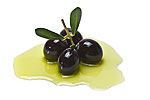 Olive oil has garnered a lot of positive press over the past few years. It has been touted as a way to fend off Alzheimer’s and cancer. The healthy oil has also been implicated in the prevention of heart disease. Now a new study released last week has shown just how amazing olive oil is at protecting your heart. In a French study that followed older adults for five years, researchers found that those who regularly used olive oil were 41% less likely to have a stroke than those who never used the oil.
Olive oil has garnered a lot of positive press over the past few years. It has been touted as a way to fend off Alzheimer’s and cancer. The healthy oil has also been implicated in the prevention of heart disease. Now a new study released last week has shown just how amazing olive oil is at protecting your heart. In a French study that followed older adults for five years, researchers found that those who regularly used olive oil were 41% less likely to have a stroke than those who never used the oil.
As an alternative cure for preventing stroke, you would be hard pressed to find a better candidate than olive oil. Olive oil is a key ingredient in the “Mediterranean diet” and some clinical trials have suggested that the diet helps control risk factors for heart disease, like high blood pressure, abdominal obesity, and elevated levels of “bad” LDL cholesterol.
High olive oil intake is also linked to a lower risk of heart attack, and a longer lifespan among heart attack survivors. These latest findings support the general health advice that people replace unhealthy dietary fats — namely, some saturated fats and “trans” fats — with olive oil and other unsaturated fats. But the research team stressed that the study does not prove that olive oil, per se, helps prevent strokes. The researchers point out that people who use a lot of olive oil may be very different from people who don’t. It is quite possible that olive oil users may, for example, have higher incomes, eat better overall, or exercise more often than people who never use the oil.
The current study included 7,625 French adults age 65 and older who reported on their diets and other lifestyle factors. People who said they used olive oil for both cooking and as a dressing were considered “intensive users.” Over the next five to six years, those intensive users suffered strokes at a rate of 0.3% per year. Now compare that to just over 0.5% among non-users, and 0.4% among moderate users. When the researchers factored in other variables, olive oil use was tied to a 41% reduction in the odds of stroke.
The research team investigated further. They also took blood samples from another 1,245 older adults, measuring their levels of oleic acid. Oleic acid is a monounsaturated fat that accounts for most of the fatty acids in olive oil. The one-third of participants with the highest oleic acid levels was an astonishing 73% less likely to suffer a stroke than the one-third with the lowest levels!
The researchers suggested that people should choose olive oil and other unsaturated fats over saturated fats (found largely in meat and dairy) and trans fats (found in some processed foods, like crackers, cookies and chips).
Although they did follow that with one cautionary note: no single food can be responsible for a significant health benefit. You need to eat plenty of fresh produce, get exercise, and stay emotionally healthy, too.
